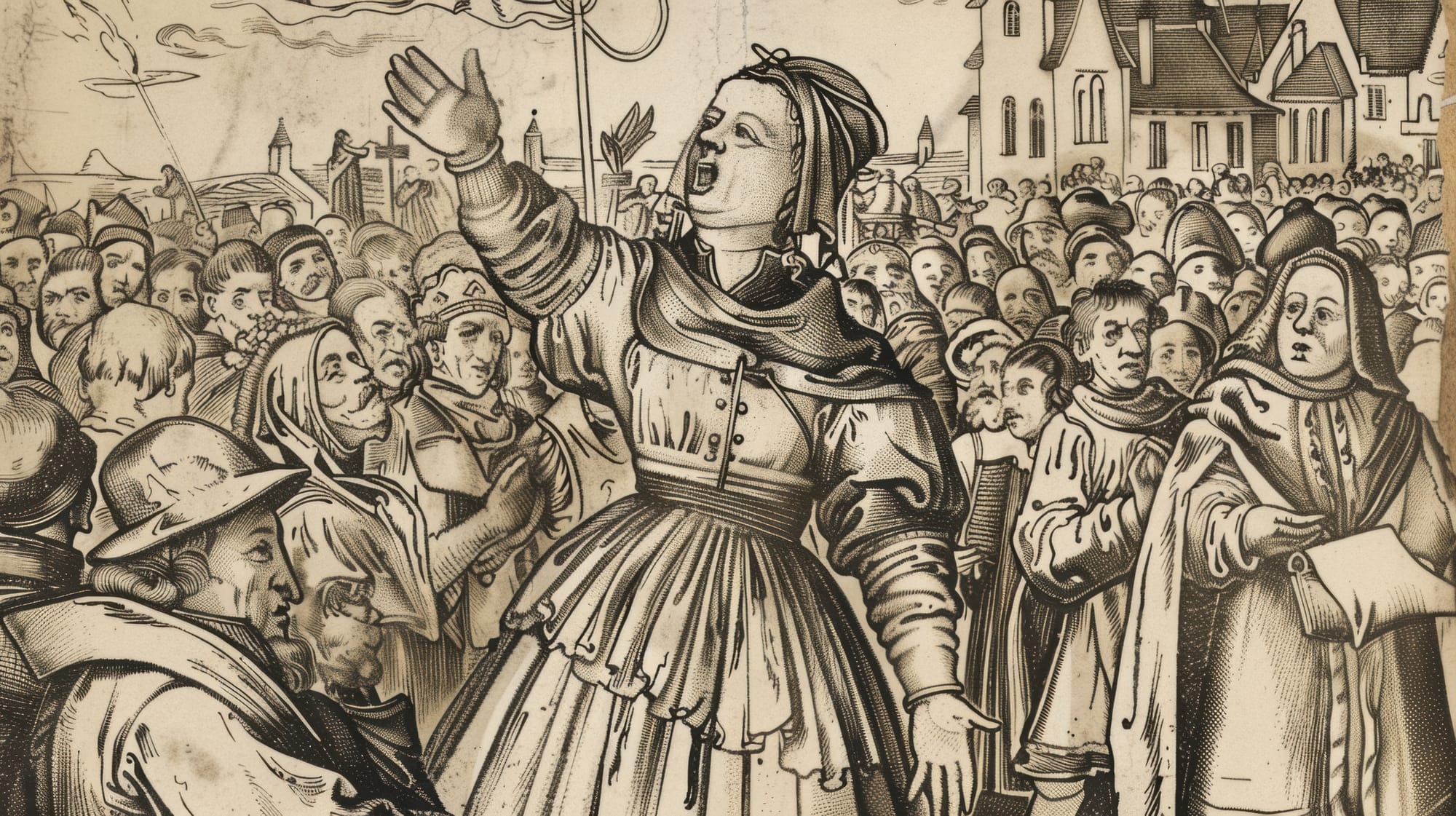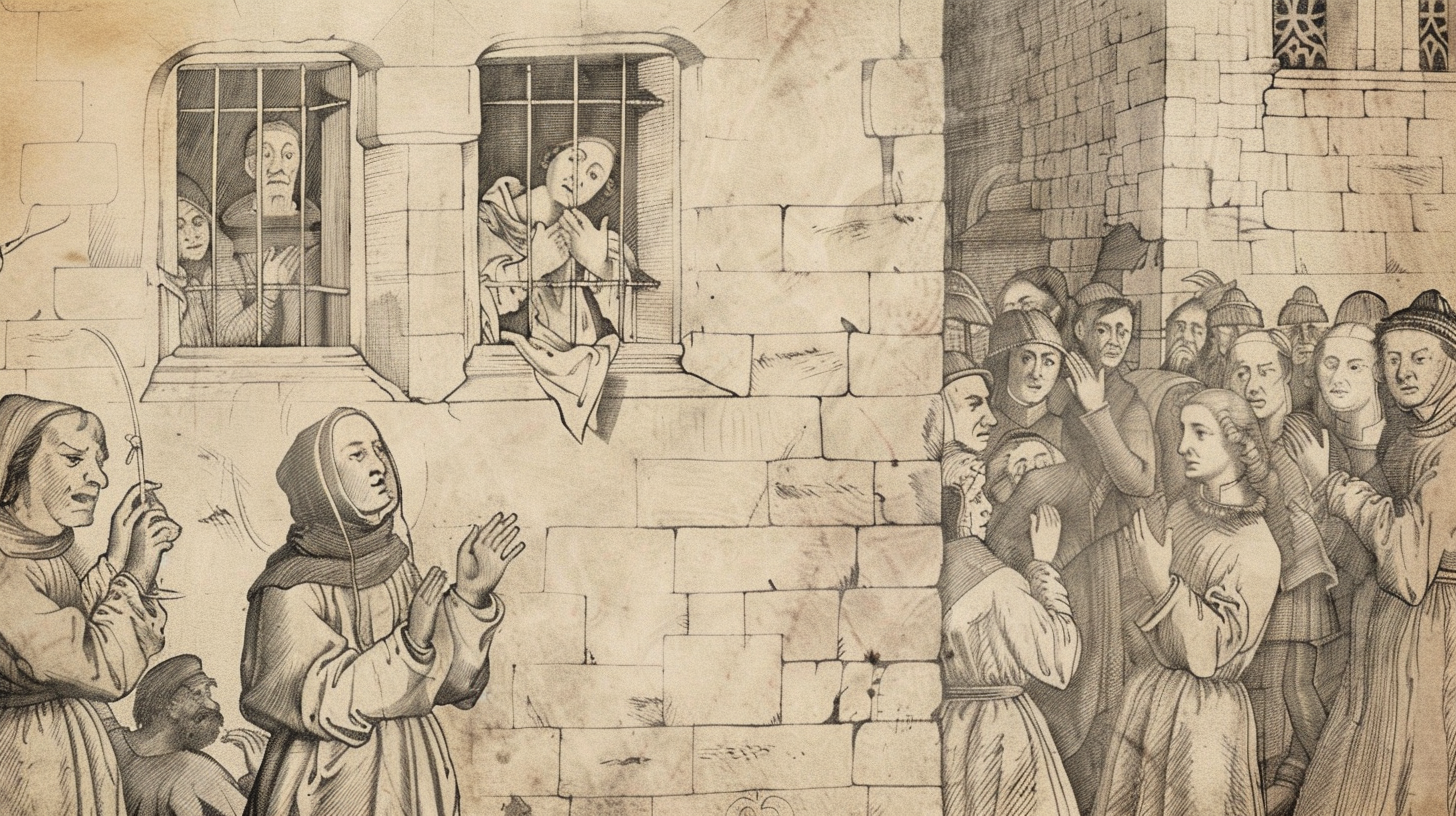The Naked Prophetess of St. Gallen

Verena Baumann, a young servant girl from the rural canton of Appenzell in Switzerland, found herself drawn to the teachings of the Anabaptists during the early 16th century. The Anabaptists believed in adult baptism, rejecting the practice of infant baptism common in the Catholic and Lutheran churches. They held that only those who consciously chose to follow Christ should be baptized, emphasizing the separation of church and state, the importance of pacifism, and the need for a simple, Bible-centered lifestyle.
St. Gallen: A Haven for Religious Dissent
The Anabaptist movement had taken root in St. Gallen, attracting followers disillusioned with the established church. Among them was Leonhard Wirth, a weaver from Lichtensteig who would later become Verena's husband. Verena left Appenzell to learn more about the Anabaptists, journeying to Tablat near St. Gallen, where she met Leonhard and other leaders like Wolfgang Ulimann, a former monk.
Baptism, Revelations, and a Growing Following
Deeply moved by their teachings, Verena chose to be baptized as an adult and join the community. She became known for her fervent devotion and claims of divine revelations, with some regarding her as a prophetess. As her influence grew, Verena exhibited unusual behavior, falling into trances, speaking in tongues, and claiming visions of God. Some followers began to see her as the embodiment of Christ.

A Shocking Display of Faith
In one intense episode, Verena led a group of followers, including Leonhard and several women she called her "disciples," to a secluded spot outside the city. There, she declared she would give birth to the Antichrist and that the Day of Judgment was near. Verena commanded her followers to remove their clothes, sitting naked on the ground in December. She herself stripped naked, engaging in strange, ritualistic behavior, claiming her actions were guided by God's will.
Arrest and Imprisonment
The authorities in St. Gallen, already concerned about the Anabaptists' growing influence, arrested Verena and her followers. Mayor Joachim Vadian, initially sympathetic to the Anabaptists but troubled by their radical views, struggled with how to handle the situation. Verena and two close female followers were imprisoned in the city's "soul house," a building used to house the sick and poor, in hopes that confinement and counseling from reformed pastors might lead them to renounce their radical beliefs.
Defiance and Expulsion
Despite this, Verena remained defiant, refusing to recant or leave voluntarily. She continued to preach and prophesy from her cell, causing further unrest. After six weeks, the city council felt they had no choice but to expel her from St. Gallen and its surrounding territories. Undeterred, Verena and her followers continued their activities in the countryside.

The Anabaptist Legacy
The story of Verena Baumann highlights the religious fervor and social upheaval of the early Reformation years. The Anabaptists, with their rejection of infant baptism and call for a radical restructuring of society, posed a challenge to both the Catholic Church and emerging Protestant establishments. Their movement would later splinter and evolve, giving rise to groups like the Mennonites, Hutterites, and Amish, who continue to uphold many core Anabaptist beliefs.
A Provocative Search for Truth
Verena's provocative actions and search for truth led to extreme behavior that tested the limits of religious and social norms. Her story also reveals the frustrations and desire for change that fueled early liberation movements like the Anabaptists. Within their community, women like Verena found a form of equality and empowerment not seen in the Catholic Church.
A Glimpse of Progressivism in Medieval Times
Despite calls for harsher punishment, Mayor Vadian chose not to harm Verena and her followers, opting for expulsion as a compromise. This decision, while not aligning with modern standards of care for individuals in mental distress, reflects a relatively progressive approach for the time. The suggestion of placing Verena in a mental institution, though likely an unpleasant prospect in the late medieval period, demonstrates an attempt to address her situation beyond mere punishment.
The Enduring Spirit of St. Gallen
The spirit of Vadian's approach seems to have endured in St. Gallen, a city known for its liberal, humanistic, and fair treatment of citizens. Today, St. Gallen remains a pleasant place to live, yet it holds fascinating and sometimes bizarre stories from its past, like that of Verena Baumann. Her tale serves as a reminder of the complex interplay between religious conviction, social change, and individual expression that shaped the city's history and continues to inform its character.




